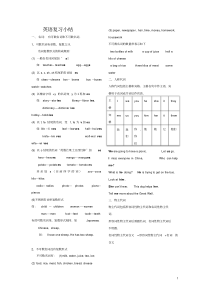 PDF
PDF
【文档说明】科普版英语六年级下册全部知识点大全(科普版).pdf,共(16)页,116.967 KB,由小喜鸽上传
转载请保留链接:https://www.ichengzhen.cn/view-148898.html
以下为本文档部分文字说明:
1英语复习小结一、名词:有可数名词和不可数名词。1、可数名词有单数、复数之分,名词复数形式的构成规则:(1)一般在名词词尾加“s‖如:teacher—teachersegg---eggs(2)以s,x,sh,c
h结尾的名词加es如class---classesbox--boxesbus--buseswatch--watches(3)以辅音字母+y的名词变y为i再加es如:story---storieslibrary---libraries,dictionary----dic
tionarieshobby---hobbies(4)以f,fe结尾的名词,变f,fe为v加es如:life---livesleaf---leaveshalf---halvesknife---kniveswolf-wolveswife-
--wives(5)以o结尾的名词“英雄芒果土豆西红柿”加eshero---heroesmango---mangoespotato---potatoestomato---tomatoes其余加s(目前所学的词)zoo---zooskilo---kilosradio—radiosphoto-
--photospiano--pianos(6)不规则名词单复数形式如:child—childrenwoman---womenman---menfoot---feettooth---teeth有的可数名词单、复
数形式相同,如Japanese,Chinese,sheep,如:Ihaveonesheep.Hehastwosheep.2、不可数名词没有复数形式不可数名词有:(1)milk,water,juice,tea,ice;(2)food,rice,meat,fish,chick
en,bread,cheese(3)paper,newspaper,hair,time,money,homework,housework不可数名词的数量常表示如下twobottlesofmilkacupofjuicehalfakiloofcheeseabagof
ricethreekilosofmeatsomewater二、人称代词人称代词包括主格和宾格。主格在句中作主语,宾格用于动词或介词后作宾语。主格Iweyouhesheitthey宾格meusyouhimheritthem我我们你,你们他她它他们W
earegoingtohaveapicnic.Letusgo.ImisseveryoneinChina.Whocanhelpme?Whatishedoing?Heistryingtogetonthebus.Lookathim.Shecan’thear.T
hisdoghelpsher.TellmemoreabouttheGreatWall.三.物主代词物主代词包括形容词性物主代词和名词性物主代词。形容词性物主代词后需跟名词,名词性物主代词后不用跟。名词性物
主代词含义=形容词性物主代词+名词的含义2形容词性物主代词myouryourhisheritstheir名词性物主代词mineoursyourshishersitstheirs我的我们的你的,你们的他的她的它的他们的Thisismybook.=Thisbookismine.Thisishisba
g.=Thisbagishis.Yourwatchisold,buthersisnew.Thanksgivingismyfavouritefestival.Wesay―Thankyou‖forourfoo
d,familyandfriends.四、疑问词who谁what什么when什么时候whattime几点where哪里why为什么how怎样howmuch多少howmany多少howold多大whose谁的whatcolour
什么颜色howlong多长1.对人物提问用whoWhogaveittoyou?Simon’sfamilygaveittome.Whocanhelpme?Icanhelpyou.2.对事物或做某事提问用whatWhatdoyouwant?I
wantahotdog.Whatareyoudoing?Iamreadingabook.Whatareyougoingtostudy?I’mgoingtostudyEnglish.Whatareyougoingtodo?We’regoingtowalkaroundthe
lake.What’sitabout?It’saboutanimals.3.对时间提问用whenWhenareyougoingtoeat?We’regoingtoeatathalfpasttwelve.
Whenwasheborn?Hewasbornin1809.4.对点钟提问用whattimeWhattimeisit?It’stwelve.Whattimedoyougetup?Igetupatsixo’clock.5.对地点提问用whereWherewasheborn?Hewasbor
ninFrance.Whereareyou?Iamonthetrain.Where’syourmum?She’satthesupermarket.6.对原因提问用whyWhyareyouwearingaraincoat?Becauseit’sgoin
gtorain.7.对身体状况或方式提问用howHowareyou?I’mfine.3Howareyougoingtogotoschool?I’mgoingtogotoschoolbybus.8.对价钱或不可数名词的数量提问用howmuchHowmuchisit?It’sthirteend
ollarsandtwenty-fivecents.Howmuchmilkdoyouwant?Iwanttwobottlesofmilk.9.对可数名词的数量提问用howmanyHowmanybooksarethereonthedesk?Therearethree
booksonthedesk.10.对年龄提问用howoldHowoldareyou?I’mtwelve.11.对“某人的”提问用whoseWhosecapisthis?It’sAmy’scap.Whosepenisthat?
It’shispen.12.对颜色提问用whatcolourWhatcolourisit?It’sblack.13.对星期提问用whatdayWhatdayisittoday?It’sMonday.14.Howlong
isit?It’saboutsixthousandsevenhundredkilometers.特殊疑问句语序:疑问词+一般疑问句语序?例:Howdoyougotoschool?疑问词(做主语)+谓语动词+⋯⋯?例:Whogaveittoy
ou?五.时态1.一般过去时表示过去某个时间发生的动作或存在的状态。经常与表示过去的时间连用。如yesterday(昨天),lastweek(上周),lastmonth(上个月),lastyear(去年),twomonthsago(两个月前)等。构成:(1)肯定句:主语+
动词过去式+⋯⋯Hemadeavideo.否定句:主语+didn't+动词原形+⋯⋯Hedidn’tmakeavideo.一般疑问句:Did+主语+动词原形+⋯⋯.?Didhemakeavideo?(2)be动词用was,were.否定句在was,were后加n
ot.一般疑问句把was,were提前到句首。ShewasborninAmerica.ShewasnotborninAmerica.WassheborninAmerica?2.现在进行时表示现在正在进行的动作构
成:主语+am/is/are+现在分词+⋯⋯Thebirdsaresinginginthetrees.否定句在am/is/are后加not.Thebirdsarenotsinginginthetrees.一般疑问句把am/is/are提前
到句首。Arethebirdssinginginthetrees?3.一般将来时表示将来某个时间要发生的动作或存在的状态。经常与表示将来的时间连用。如tomorrow(明天),nextweek(下周),nextyear(明年)等。构成:(1)主语+will+动词原形+⋯⋯Hewillpickupt
heapples.否定句在will后加not.Hewillnotpickuptheapples.一般疑问句把will提前到句首。Willhepickuptheapples?(2)主语+begoingto+动词原形+⋯⋯WearegoingtostudyFrench.否定句在am/is/are后
加not.WearenotgoingtostudyFrench.一般疑问句把am/is/are提前到句4首。AreyougoingtostudyFrench?4.一般现在时表示经常性,习惯性的动作或存在的状态。构成:(1)主语+am/is/are+⋯⋯否定句在
am/is/are后加not.一般疑问句把am/is/are提前到句首。HelenKellerisamodelforblindpeopleandforyouandme.(2)肯定句:主语+动词原形+⋯⋯Theduckslikeit.否定句:主语+don't+动词原形+⋯⋯Th
educksdon’tlikeit.一般疑问句:Do+主语+动词原形+⋯⋯.?Dotheduckslikeit?(3)肯定句:主语(三单)+动词第三人称单数形式+⋯⋯Helikesnoodles.否定句:主语+doesn't+动词原形+⋯⋯Hedoesn’tlikenoodles.一般疑问
句:Does+主语+动词原形+⋯⋯.?Doeshelikenoodles六.动词过去式形式规则动词的过去式构成1.一般在动词词尾加ed如:work---workedplay---playedwatch--watched2.以e结尾动词在词尾加d如:live---lived3.以辅音
字母+y结尾的动词,把y变为i再加ed如:study---studiedcopy---copiedcry---criedcarry---carried4.有些动词双写最后一个字母再加ed,如:stop---stoppeddro
p---dropped5、不规则动词的过去式变化规律性不强,须多加记忆。动词原形动词过去式动词原形动词过去式gowentcomecamebecomebecamebringbroughtsaysaidputputteachtaughtcancouldreadread
givegaveam/iswasareweredodidflyflewhavehadmakemaderunranseesawriderodewinwongetgottelltoldeatatesendsenttaketookbuyboughtsitsatmeetmetwritewrote
drawdrewswimswamflyflewrinkdrankgivegaveringrangfallfell七.动词ing形式也是现在分词形式现在分词的构成规则1.一般在动词词尾直接加“ing”sleep---sleepinglook---lookingwear---w
earingsend---sendingeat---eatingsing---singinggo---goingjump---jumping5play---playing2.以不发音的e结尾的动词要去掉e再加上“ing”write--
-writingcome---comingride---ridinghave---havingmake---makingshine---shiningtake---takingclose--closing3.有些动词双写最后一个字母再加“ing”get-
--gettingput---puttingsit---sittingrun---runningswim---swimmingskip---skippingshop---shopping八.动词第三人称单数形式动词第三人称单数的构
成规则1.大多数动词在词尾加“S”.stop-stopsmake-makesread-readsplay-playssay[sei]-says[sez]2.以辅音字母加“y”结尾的,要先将“y”变为“i”
,然后在加“es”fly-fliescarry-carriesstudy-studiesworry-worries3.以“s,x,sh,ch,o”结尾,在词尾加“es”.teach-teacheswatch-watch
esgo—goesdo--does九、情态动词can过去式could后加动词原形IcanwriteEnglish.Icancarrythisbag.Icanhelpyou.Wecanalwaysbefriends.Latershecouldreadandwrite.否定句在ca
n,could后加notcannot=can’tcouldnot=couldn’tWecan’tgonow.Ican’twriteChinese.Ican’tcarryeverything.Hisfriendscan’thearhim.Shecouldn’tseeand
shecouldn’thear.一般疑问句把can,could提前到句首。Canyouswim?Yes,Ican./No,Ican’t.CanyouspeakEnglish?CanIwritetoyourfri
ends?CanyoubemyChinesepenfriend?Yes,ofcourse.十.反义词big---smalllong---shortnew---oldtall---shortyoung---oldheavy-
--lighteasy---hard/difficultup---downearly---latefat---thinwhite---blackcry---laughdifferent---sameinside---outsidehot---coldhap
py---sadgood---badclean---dirtybring---takethis---thatthese---thosealways---neverwoman---man十一、同音词for---fourso
n---sunhour---ourtoo--tworight---writeeye---Iaren’t---auntsent---centwhere---weartheir---thereby---buysee---sea
十二.、近义词6good---wellstudy---learn十三、缩写形式与完全形式Iam=I’mheis=he’ssheis=she’sitis=it’sthatis=that’swhatis=what’sletus=let’sweare=we’retheyare=they’reyouar
e=you’recannot=can’tcouldnot=couldn’tshouldnot=shouldn’twillnot=won’tI’ll=Iwillwe’ll=wewilldonot=don’tdoesnot=doesn’tdidnot=didn’t
ithasgot=it’sgotIhavegot=I’vegothavenot=haven’thasnot=hasn’tarenot=aren’tisnot=isn’t十四、小学英语分类单词和词组天气:rain下雨snow下雪rainy有雨
的snowy有雪的hot炎热的cold寒冷的warm温暖的cool凉爽的windy有风的sunny晴朗的食物:hamburger汉堡hotdog热狗sandwich三明治chip薯条chicken鸡肉fish鱼肉meat肉noodles面条rice大米soup汤cake蛋糕bread面
包cheese奶酪vegetable蔬菜fruit水果sausage香肠biscuit饼干sweets糖果icecream冰激凌peanut花生饮料:milk牛奶tea茶orangejuice橙汁coffee咖啡cola可乐water水juice果汁颜色:red红色的gre
en绿色的yellow黄色的black黑色的white白色的orange橙色的blue蓝色的purple紫色的pink粉红色的星期:Monday星期一Tuesday星期二Wednesday星期三Thursday星期四Friday星期五Saturday星期六Sunday星
期日月份:January一月February二月March三月April四月May五月June六月July七月August八月September九月October十月November十一月December十二月季节:spring春天summer夏天autumn秋天winter冬天数字:
one一two二three三four四five五six六seven七eight八nine九ten十eleven十一twelve十二thirteen十三fourteen十四fifteen十五sixteen十六seventeen十七eightee
n十八nineteen十九twenty二十thirty三十forty四十fifty五十sixty六十seventy七十eighty八十ninety九十onehundred一百onethousand一千onemillion一百万7衣服:T-shirtT恤衫dress裙子sweat
er毛衣trousers裤子skirt短裙sock袜子shoe鞋coat外套,上衣动物:cat猫dog狗monkey猴panda熊猫elephant大象tiger老虎lion狮子pig猪chameleon变色
龙snake蛇mouse老鼠bear熊kangaroo袋鼠frog青蛙parrot鹦鹉bird鸟owl猫头鹰camel骆驼家庭成员:grandmother奶奶grandfather爷爷grandparents祖父母mother妈妈father爸爸parents父母亲brot
her兄弟sister姐妹uncle叔,伯,舅aunt阿姨cousin表兄弟学科:Chinese语文English英语Math数学PE体育Art艺术Science科学Physics物理Chemistry化学History历史Ge
ography地理节日:FlagDay国旗日ThanksgivingDay感恩节Halloween万圣节EasterFestival复活节Christmas圣诞节SpringFestival春节LanternFestival元宵节DragonBoatFestival
端午节Mid-AutumnFestival中秋节名胜景点:BigBen大本钟theRiverThames泰晤士河HydePark海德公园TowerBridge塔桥theLondonBridge伦敦桥theBritishMuseum大英博物馆theLondonE
ye伦敦眼theGreatWall长城theSummerPalace颐和园theChangjiangRiver长江theWestLake西湖theHuangshanMountain黄山TheMingTombs明十三陵MountQomolangma珠穆朗玛峰球类:playfootb
all踢足球playbasketball打篮球playbaseball打棒球playtabletennis打乒乓球playvolleyball打排球棋类:playchess下象棋乐器:playtheguitar弹吉他playthedrums敲鼓playthez
ither弹吉他playthepiano弹钢琴playtheflute吹笛子playthetrumpet吹小号体育运动:haveaSportsDay举行运动会domorningexercises做早操doTaijiquan打太极拳dothehighjump跳远dothelongjump跳高runt
he100meters跑一百米runfast跑得快jumphigh跳高jumplong跳远swim游泳goswimming去游泳skip跳绳controltheball控制球catchtheball接球rowabo
at划船生日:HappyBirthday!生日快乐makeabirthdaycard制作生日卡片haveabirthdayparty举办生日派对haveagreatbirthday过愉快的生日交通工具:bybus乘公共汽车b
ycar乘小汽车bybike骑自行车byplane乘飞机byship乘轮船bytrain坐8火车onfoot步行词组:flykites或者flyakite放风筝gotoseefilms去看电影watchTV看电视playcomputergames玩电脑游戏haveapicnic吃野餐gotos
chool去上学gohome回家gotothepark去公园gotomiddleschool去上中学gotobed去睡觉gothere去那里goshopping去购物gotothedoctor去看病saygoodnight道晚安flyaway飘走m
akeavideo制作录像makemistakes犯错误writealetter写信writeabook写书takepictures=takephotos照相listentomusic听音乐readabook读书readstories
读故事dohomework做作业makeacake做蛋糕makedumplings做饺子washclothes洗衣服makeane-card制作电子卡片rideahorse骑马climbmountains爬山climbtrees爬树havealovelyti
me玩的开心askquestions问问题makealist列清单shoppinglist购物单collectstamps收集邮票singsongs唱歌turnleft向左转cleantheclassroom打扫教室eatfastfood吃快餐turnright向右转gostraighto
n直走haveacold感冒haveaheadache头疼havebreakfast吃早餐havelunch吃午餐havesupper吃晚餐=havedinnerhaveabaseballteam组建棒球队comeon加油comein进来comefrom来自=
befromcomeback回来clickon点击goupthehill上山godownthehill下山playwithdolls玩洋娃娃findout查找begoodat擅长bringback归还outof往外ofcourse当然可以inEnglish用英语allovertheworl
d=allaroundtheworld全世界standup起立sitdown坐下attheweekend在周末not⋯atall一点也不getup起床geton上车getoff下车inahurry匆忙nextto挨着turnonthelight打开灯pointto指向t
alkabout谈论talktosb和某人谈话giveout分发writetosb给某人写信sayhellotosb向某人打招呼缩写:thePRC=thePeople’sRepublicofChina中华人民共和国theUSA=theUnitedStatesofAmerica美国th
eUN=theUnitedNations联合国theUK=theUnitedKingdom英国现在进行时和动词的现在分词现在进行时动词的现在进行时由be的现在时形式“am/is/are+现在分词”构成,主要用于以下几方面。(1)用来表示现在正在进行或发生的动作。例如:Whatareyoudoi
ng?Weareplayingbasketball.你们在干什么?我们在打篮球。(2)有时用来表示现阶段正在进行,而说话时不一定正在进行的动作。例如:Aretheyworkinghardthisterm?9这学期他们在努力学习吗?Wearepickingapplesonafarmtheseda
ys.这些天我们正在农场摘苹果。(3)表示即将发生的动作(如在最近按计划或安排好要进行的动作)。Come,go,leave,start,arrive等动词常与将来时间的状语连用表示这种意义。例如:TheyaregoingtoShangha
ithisFriday.他们这个星期要去上海。Tomiscomingherenextweek.汤姆下周要来这儿。(4)说明:不是所有动词都能用现在进行时态的,如:see、like、want、know等动词往往都不用进行时态.现在进行时态的肯定、否定和疑问式及特殊疑问句1)现在进行时
的肯定形式:主语+be(am/is/are)+doing+其他成分Iamsinging.Theyarewriting.2)现在进行时的否定形式:主语+be(am/is/are)+not+doing+其他成分Iamnotsinging.Theyar
en’twriting.3)一般疑问句及回答:be(am/is/are)+主语+doing+其他成分Areyousinging?Yes,Iam./No,I’mnot.Aretheywriting?Yes,theyare./No,theyaren’
t.4)特殊疑问句及回答:特殊疑问词+be(am/is/are)+主语+doing+其他成分Whatareyoudoing?Weareplaying(要求就提问内容具体回答).缩写形式如下:Iam---I’mYouare---You’reHeis---He’sSheis---She’sI
tis---It’sWeare---We’reTheyare---They’re动词的—ing形式的构成(1)一般在动词原形末尾加—ing。例如:work—working,study—studying.(2)以不发音的字母e结尾的动词,先去掉e,再加
—ing。例如:have—having,live—living.(3)以重读闭音节结尾的动词,如结尾只有一个辅音字母,应先双写出这一字母,再加—ing。例如:run—running,stop—stopping,forget—forgettin
g,begin—beginning.练习题一、写出下列动词的现在分词。walkjumpwatchsendsingridewritehavemaketakedancedrivecomeshineseerunswimsitshopgetskipputgo
playstop10二、用现在进行时完成下列句子:1.______you__________(fly)akitenow?Yes,_______.2.Theboy(draw)apicturenow.3.Listen!Thechi
ldren(read)booksintheclassroom.4.We_____________(play)footballnow.5.What_________you__________(do)now?6.Listen!Thegirl_____________(sing)anEnglish
song.7.Look!They(dance)inthemusicroom.8.It’s6o’clocknow.Wedinnernow.9.Look!Theseboys_________(play)tenniso
ntheplayground.10.Mymotheris______________(cook)inthekitchen.11.Nowshe(shop)atthesupermarket.12.Inthisphoto,Amy(clea
n)theroom.13.They(notswim)now.14.“Mary(wash)clothes?”“Yes,sheis.”15.Lookatyourgrandpa.He(water)flowers.16.She(play)now.17.We(sit)onthebeachnow.1
8.Don’tcomein!I(take)abath.19.Thecat(run)inthegardennow.20.Look!Thebird(fly)inthesky.三、选择1.Look!Lucyis_____anewbiketoday.A.jumpingB.runningC.ridi
ngDtaking2.Thechildren_____football.A.isplayingB.areplayingC.playtheD.playa3.They______TVintheevening.Theydotheirhom
ework.A.arewatchingB.can’twatchingC.don’twatchD.don’twatching4.Listen!She____intheclassroom.A.issingingB.singC.tosingD.issing5.______areyoueating?I
’meating______meat.A.What,someB.Which,anyC.Where,notD.What,a6.Isshe____something?A.eatB.eatingC.eattingD.eats7.Look!Thechild
ren_______basketballontheplayground.11A.playsB.playedC.isplayingD.areplaying8.JackandKetty_______inthelake.Let’sjointhem,shallwe?A.swimB.haveswumC.s
wamD.areswimming9.It’ssixintheafternoon.TheGreens_______lunchtogether.A.hasB.arehavingC.havehadD.hadhad10.Ionth
echairnow.A.issittingB.amsittingC.amsiting11.Sheballnow.A.isplayB.playsC.isplaying12.Tomonthebed.A.arejumpingB
.isjumpingC.isjump13.Myparentsinthekitchen.A.iscookingB.arecookingC.cooks14.Listen!Thebaby.A.cryB.criesC.iscrying15.Theca
tinthegarden.A.isrunningB.isruningC.run16.Lindanow.A.issmileB.issmileingC.issmiling17.Look!Thebird.A.isflyB.fl
yingC.isflying18.Don’tbotherme!I.A.workB.isworkingC.amworking19.Don’tcomein!She.A.takeabathB.istakeingabathC.istakingabath20.
Elvajuicenow.A.drinksB.isdrinking21.Tomhisteethnow.A.brushB.brushesC.isbrushingD.willbrush22.Henow.A.smokeB.smokesC.issmokingD.willsmoke23.Look
!Thatgirl.A.danceB.dancesC.isdancingD.willdance24.Listen!Thebaby.A.cryB.criesC.iscryingD.willcry25.Henow.A.danceB.dancesC.isdancingD.willdance26.Look
!Themonkeyabanana.A.peelB.peelsC.ispeelingD.willpeel27.Don’tbesonaughty!Mymother.A.sleepB.sleepsC.issl
eepingD.willsleep1228.Catsonthefloornow.A.sleepB.aresleepingC.aresleeppingD.sleeps29.Listen!She.A.singB.singsC.issingingD.willsing30.I_____form
yfriendsnow.A:willwaitB:amwaitingC:waitedD:waits31.Thebaby-sitter_______thebabynow.A:willfeedB:isfeedingC:feedsD:fed32.Hismother_____himEng
lishnow.A:willteachB:isteachingC:teachesD:taught33.He____themountainnow.A:climbsB:isclimbingC:willclimbD:climbed34.Joe_____ahamburgerno
w.A:iseatingB:willeatC:eatsD:ate祈使句表示请求、命令、叮嘱、邀请、劝告等。祈使句的主语you通常省略,肯定句以动词原形开头。否定句Don’t+动词原形+其他。Becareful.Bequiet.Lookatt
heballoons.Standup.Pleasestandinline.Let’sgounderthattree.Turnright.Don’tworry.Don’ttalkinthelibrary.Don’twalkonthegrass.Gostraighton
.Turnleft.Lookatthelibraryrules.Therebe句型Therebe句型表示某地或某时间有某物。Thereis后加单数名词或者不可数名词。Thereare后加可数名词的复数形式。Therearetenpenci
lsinthebluebox.Thereweren’tanybusesmanyyearsago.ThereisaChinatowninNewYork.Therewasasmallhousefouryearsago.Thereissomewaterinthebottle
.TherearelotsofChineseshopsthere.TherearelotsofbicyclesinChina.There’sChinesedancing.---Istherealetterforme
?---Yes,thereis.英语作文1.假期去过的地方Lastsummerholiday,IwenttoBeijingwithmyparents.BeijingisinthenorthofChina.Wewenttherebytrain.InBeiji
ngIvisitedlotsofplaces.IclimbedtheGreatWall.Ihadagoodtimethere.2.假期计划IamgoingtogotoBeijingthissummerholiday.BeijingisinthenorthofChina.It’sve
ryfamous.Iamgoingtogotherebytrain.InBeijingIamgoingtoclimbtheGreatWall.IamgoingtovisitTian’anmenSquare.3.描述图片中人物正
在做的事情Lookatthispicture.Therearefivepeopleinit.Amyisreadingabook.Samislisteningtomusic.Damingisflyingakit
e.Tomisplayingwithtoys.Simonisridingabike.Theyareveryhappy.4.喜欢的动物Ilikedogsverymuch.Ihaveapetdog.It’sverycute.Itsname
isDudu.It’sblack.Ithasgottwobigeyes13andasmallnose.Itlikeseatingmeat.Itcanrunfast.Ioftenplaywithit.5.喜欢的季节My
favouriteseasonisspring.Inspring,it’swarm.Therearelotsofbeautifulflowers.Icanenjoythem.Icanhaveapicni
cinthepark.Icanflyakite.Icandolotsofinterestingthings.SoIlikespring.6.我的爱好MyhobbyCollectingstampsismyhobby.Ilikestampsver
ymuch.Ihavegotlotsofstamps.Somestampsareaboutanimals.Somestampsareaboutfamousmenandwomen.IhavegotChinesestamps.ButIhaven’tgotEn
glishstamps.Collectingstampsisinteresting.7.喜欢的节日MyfavouritefestivalisSpringFestival.AtSpringFestival,I
canplaywithmyfriends.Icaneatlotsofdeliciousfood.Icangetsomemoney.Wehaveaspecialmeal.It’sabigdinner.IloveSpringFes
tival.8.梦想Ihaveadream.IwanttobeanEnglishteacher.BecauseIlikeEnglish.IthinkEnglishisinterestinganduseful.Ica
nspeakEnglishwell.NowIstudyveryhard.Ihopemydreamwillcometrue.9.我的学校MyschoolMyschoolisverybigandbeautiful.Inourschooltherearesom
etallbuildings.Thewallsarewhite.Thewindowsarebright.Inourschooltherearelotsofpupilsandteachers.Thepupilsstudyhard
.Theteachersworkhard.Ilovemyschool.10.喜欢的运动Playingbasketballismyfavouritesport.Becauseit’sveryinteresting.Ihavegotabasketball.Iplaybasket
balleveryday.Myfriendslikebasketball,too.Ioftenplaywithmyfriends.Ihopetobeabasketballstar.11.我的朋友MyfriendIhaveagoodfriend.HernameisAmy.She
istwelveyearsold.Shehasgotbigeyes.Sheistall.Sheisfriendly.Shelikesreadingbooks.ShecanspeakEnglishwell.Weallli
keher.12.自我介绍MynameisAmy.Iamtwelveyearsold.Ihavegotbigeyes.Iamtall.Iamfriendly.Ilikereadingbooks.IcanspeakEnglis
hwell.Icanplaybasketball.ButIcan’tswim.Iwanttobeateacher.13.我的家庭MyfamilyIhaveahappyfamily.Therearethreepeopleinmyfamil
y,myfather,mymotherandI.Myfatherisateacher.Heteachesmath.Mymotherisateacher,too.SheteachesEnglish.Iamapupil.Wealllikereadingbo
oks.14.给朋友写一封信告诉他你上个周末所做的事情DearAmy,Howareyou?IhadaveryfunnydayonSunday.InthemorningIhadapicnicinthepark.IntheafternoonIdi
dmyhomework.Ihelpedmymumdothehousework.IntheeveningIwatchedTV.Ihadagoodtime.Imissyou.Pleasewritesoon.Lovefrom,Sam15.我一天的生活Igetup
atsixinthemorning.Ihavemilkandeggsforbreakfast.ThenIgotoschoolbybus.Ihavefourlessonsinthemorning.Ihavelunchathome.Ihavetwolessonsintheafter
noon.AfterschoolIdomyhomework.Igotobedatnineintheevening.16.我的家乡myhometownJiaozuoismyhometown.It’sabeautifulplace.It’sinthenor
thofChina.InJiaozuotherearelotsofbeautifulplaces.YuntaiMountainisveryfamous.Everyyearlotsofvisitit.In
Jiaozuowehavegotlotsofdeliciousfood.Peopleareveryfriendly.Ilovemyhometown.17.介绍一位名人InOctober2003,ShenzhouVflewintospacewithYangLiwei.HewasChina’
sfirstmaninspace.YangLiweiisfromLiaoling.Firsthebecameapilot.Thenhebecameataikonaut.YangLiweispentabouttwenty-onehoursinspace
.Hemadeavideoabouthisspacetravel.Lotsofpeoplesawit.Heisvery,veryfamous.十五.1.介词后加动词ing形式It’sforplayingbaseball.2.说某种语言用speak14WearegoingtospeakChinese
.IcanspeakEnglish.HecanspeakFrench.3.辅音音素前用a,元音音素前用anahotdogacaranhouranicecreamanappleanorangeanegganemailananimalanele
phant4.想做某事wanttodosomethingWhatdoyouwanttoeat?Whatdoyouwanttodrink?DoyouwanttogotoChinatown?Iwanttogoswimming.想让某人做某事wantsomebodytodosthIwantedyout
obringthebaseballcaps.Iwantyoutobemyfriends.5.be动词包括am,is,are.用法我接am你接are,is跟着他她它。单数不可数用is,复数用are.IaminClassOne.YouareinClassTwo.HeisinClassTh
ree.Ourpicniciswet.Mynewspaperisflyingaway.Theseducksareverynoisy.Theorangesarefalling.Thesepostcardsaregreat.6.询问天气用What’sthewea
therlike?或者Howistheweather?描述天气用动词或者be+表示天气的形容词It’sgoingtosnowinHarbin.It’sgoingtorainsoon.It’sgoingtobesunnytomorrow.7.在星期几,
具体的某一天用onIhadaveryfunnydayonSaturday.onTeachers’DayonFlagDayonThanksgivingDay8.look表示看,看起来lookat表示看某物某人se
e表示看见lookoutof往⋯⋯外看Look!Heisrunning.Itlooksgood.Icanseeyou.Wearelookingatsomeducks.Iamlookingoutofthewindow.Lookatthisone.9.名词所有格表
示某人的,一般在名词词尾加’s.I’mmakingDaming’sbirthdaycard.10.球类前不加the,乐器前加theDamingisplayingthetrumpet.Icanplaytheviolin.I’mgoingt
oplayfootballwithmyfriends.11.在某年,某月,某季节,在上午,下午,晚上用ininOctober2003in1809inspringinthemorningintheafternoonint
heevening15.beproudof为⋯⋯.感到自豪Hewasveryproudofhim.16.许多的lotsof等于alotof后加复数名词或者不可数名词many后加复数名词much后加不可数名词lotsofpeoplelotsofmistakesmanybooksmuc
hmilk17.What’sthematter?怎么了?18.在某一时刻用atWearegoingtohaveapartyathalfpastsix.19.let’s等于letus后加动词原形Let’sgo.Let’ssendanemailtoDad.1520.Hereyouare.给你
!21.some用于肯定句中,any用于否定句和疑问句中Iamsendingsomephotos.IcanspeaksomeEnglish.ThesearesomestampsfromCanada.Thereweren’tanytelevisionsmanyyearsago.Haveyo
ugotanyAmericanstamps?20.too当“也”用时,放在句尾。Thecolaisfalling,too.too还可以当“太”讲It’stoobigforyou.toomany太多Therear
etoomanybooksonthedesk.22.Thankyoufor⋯⋯.Thankyouforyouremail.Thankyoufortalkingtous.23.Whatabout⋯⋯?等于Howabout
⋯⋯?后加名词,代词宾格,动词ing形式。Whataboutchopsticks?Howaboutyou?Whataboutswimming?24.buysth.forsb.=buysb.sth.给某人买某物Iboughtyouab
ook.=Iboughtabookforyou.23.givesth.tosb.=givesb.sth.给某人某物PleasegivethesepencilstoAmy.=PleasegiveAmythesepencils.Hegivespresentstothechildren.
GrandmagivesDamingapresent.24.learntodosth学会做某事Helenlearnedtospeak.Latershelearnedtoread.25.喜欢做某事likedoingsth.Ilikecollectingstamps.Heli
kesplayingthetrumpet.Ilikereadingandswimming.26.bereadyfor为⋯..做好准备Areyoureadyforyourtriptomorrow?27.---Happybirthdaytoyou.---Thankyou.
28.---Thankyouverymuch.---Youarewelcome./That’sallright.29.---I’msorry.---Itdoesn’tmatter./Notatall./That’sallright.That’sall
right.=That’sokay/OK.30.---Nicetomeetyou.---Nicetomeetyou,too.31.---Howareyou?---I’mfine,thankyou.32.---Howdoyoudo?---Howdoyoudo?33.---Wouldyouli
ketocometoschoolwithus?---Yes,I’dloveto.34.---Wouldyoulikesomejuice?---Yes,please.---Wouldyoulikesomebread?---No,thanks.35.---What’sthedatet
oday?---It’sJune1.36.---CanIaskyousomequestions?---Yes,ofcourse.37.thesameas与⋯⋯一样LineAisthesameasLineB.38.waitfor⋯.等候某人某物Waitforu
s.39.should应该shouldn’t不应该后加动词原形Youshouldeatfruit.Youshouldn’twalkintheroad.41.–Whatdoyouhaveforbreakfast?--Ihaveeggs.42.atscho
ol在学校athome在家onTV43.感叹句WhataninterestingCD-ROM!Whatamess!16Whatabigbuilding!Whatafantasticpresent!44.Wh
athappenedtohim?45.---Doyoulikemeat?---Yes,Ido./No,Idon’t.46.---DoesDaminglikepears?---Yes,hedoes./No,hed
oesn’t.47.---What’sthetime?=Whattimeisit?(几点了?)---It’ssix.48.---Goodmorning.---Goodmorning.49.---Goodafternoon.---G
oodafternoon.50.---Goodevening.---Goodevening.51.---Goodbye.---Goodbye.52.It’stimetodosomething.该做某事了。It’stimetosaygoodbye.It’stimetohavedinner
.53.I’mgoingtowalktoschool.=I’mgoingtogotoschoolonfoot.54.I’mgoingtoridemybiketoschool.=I’mgoingtogotoschoolbybike.55.表示方位时,在某一范围
之内用inNewYorkisintheeastofAmerica.SanFranciscoisinthewestofAmerica.QingdaoisintheeastofChina.BeijingisthecapitalofChina.It’sinthenort
hofChina.HainanisinthesouthofChina.56.询问职业身份时可以用What+am/is/are+主语?WhatamI?Areyouateacher?Yes,Iam.Whatareyou?I
amadoctor.Whatisyourfather?Heisapoliceman.57.动词做主语常用动词ing形式。Collectingstampsismyhobby.Readingismyhobby.Flyingkitesismyhobby.58.apictureof一张⋯⋯的图片It’sa
pictureoftheGreatWall.ThisonehasgotapictureoftheGreatWallonit.
 辽公网安备 21102102000191号
辽公网安备 21102102000191号
 营业执照
营业执照